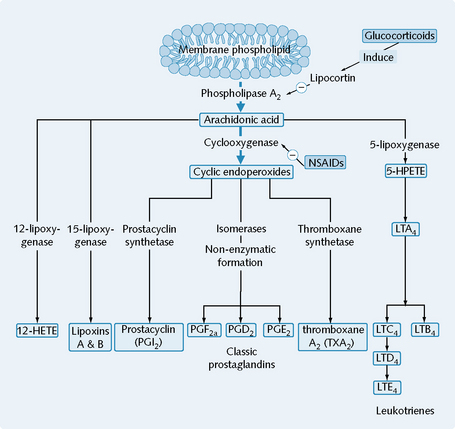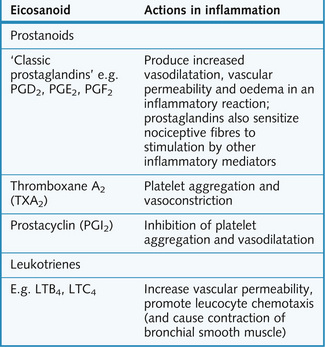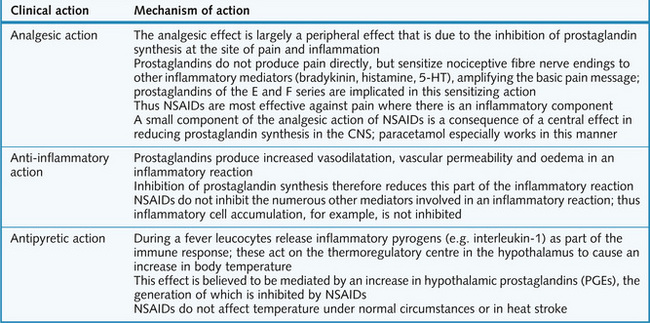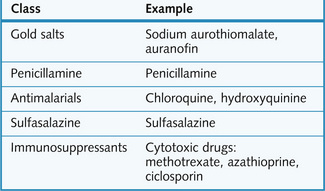10 Inflammation, allergic diseases and immunosuppression
Inflammation
Arachidonic acid metabolites: the eicosanoids
The eicosanoids are a family of polyunsaturated fatty acids formed from arachidonic acid. The biosynthetic pathway is shown in Figure 10.1. Arachidonic acid is derived mainly from phospholipids of cell membranes, from which it is mobilized by the action of the enzyme phospholipase A2. Arachidonic acid is then further metabolized:
The actions of eicosanoids in inflammatory reactions are listed in Figure 10.2.
Anti-inflammatory drugs
The main drugs used for their broad-spectrum anti-inflammatory effects are:
Both these classes of anti-inflammatory drug exert their effect by inhibiting the formation of eicosanoids (see Fig. 10.1).
NSAIDs
NSAIDs all possess the ability to inhibit both forms of the enzyme cyclooxygenase (see Fig. 10.1), an action that is responsible for their pharmacological effects (see Fig. 10.4).
The first drugs of this type were the salicylates (e.g. aspirin), extracted from the bark of the willow tree. Subsequently, many synthetic and semi-synthetic NSAIDs have been created. Chemically and structurally heterogeneous, they are related through their common mechanism of action (Fig. 10.3).
Mechanism of action
Cyclooxygenase exists in two enzyme isoforms:
Clinical effects
NSAIDs work by the inhibition of cyclooxygenase and resulting inhibition of prostaglandin synthesis, producing three major clinical actions of potential therapeutic benefit: analgesia, an anti-inflammatory action and an antipyretic action (Fig. 10.4).
Not all NSAIDs possess these three actions to exactly the same extent, an example being the lack of anti-inflammatory activity possessed by paracetamol (see Fig. 10.3).
In addition aspirin has a pronounced effect on inhibiting platelet aggregation, due to reduced thromboxane synthesis. It is used in the primary and secondary prevention of cardiovascular and cerebrovascular events (Ch. 2).
Therapeutic notes on individual NSAIDs
Salicylic acids, e.g. aspirin:
Propionic acids, e.g. ibuprofen:
Acetic acids, e.g. indometacin:
Pyrazolones, e.g. phenylbutazone:
Fenemates, e.g. mefenamic acid:
para-Aminophenols, e.g. paracetamol:
COX-2 specific inhibitors, e.g. lumiracoxib and celecoxib:
Steroidal anti-inflammatory drugs (glucocorticoids)
There are two main groups of corticosteroids, the glucocorticoids and the mineralocorticoids. It is the glucocorticoids (such as cortisone and cortisol), which posses powerful anti-inflammatory actions that make them useful in several diseases, e.g. rheumatoid arthritis, inflammatory bowel conditions, bronchial asthma (see Ch. 3) and inflammatory conditions of the skin.
Inflammatory diseases
Rheumatoid arthritis
DMARDs (disease modifying anti-rheumatic drugs)
DMARDs are a diverse group of agents that are mainly used in the treatment of rheumatoid arthritis, which is a chronic, progressive and destructive inflammatory disease of the joints (Fig. 10.6).
Gold salts
Examples of gold salts include sodium aurothiomalate and auranofin.
Antimalarials
Examples of antimalarials include chloroquine and hydroxychloroquine (Ch. 11).
Immunosuppressants
Certain drugs with immunosuppressive actions have been shown to be effective in rheumatoid arthritis. These include azathioprine, ciclosporin and corticosteroids which may work by suppressing the autoimmune component of rheumatoid arthritis (p. 154).
Stay updated, free articles. Join our Telegram channel

Full access? Get Clinical Tree








